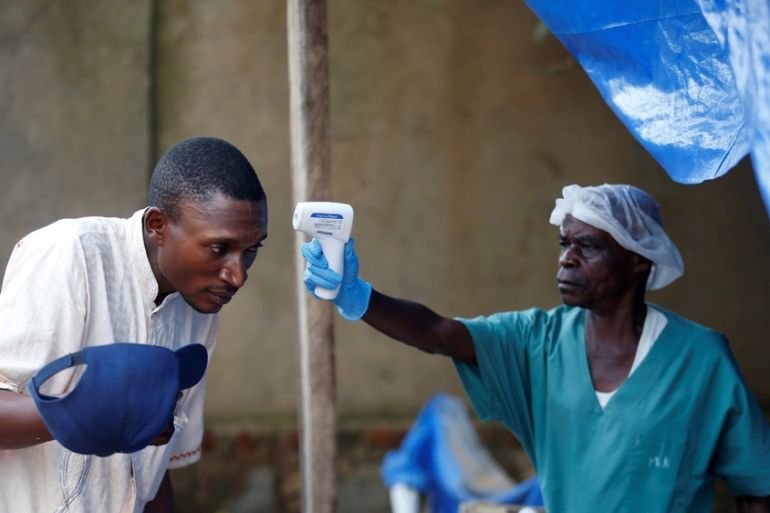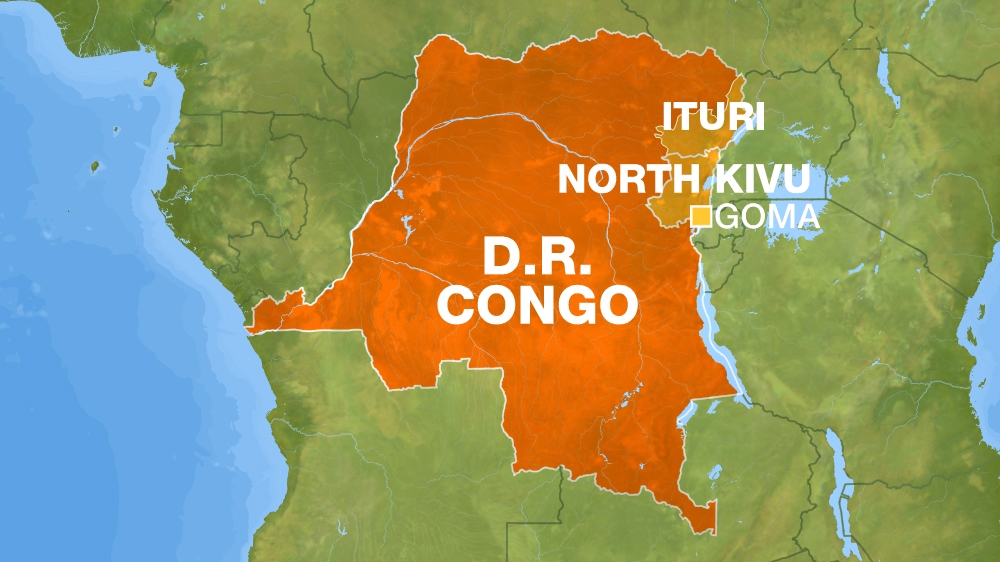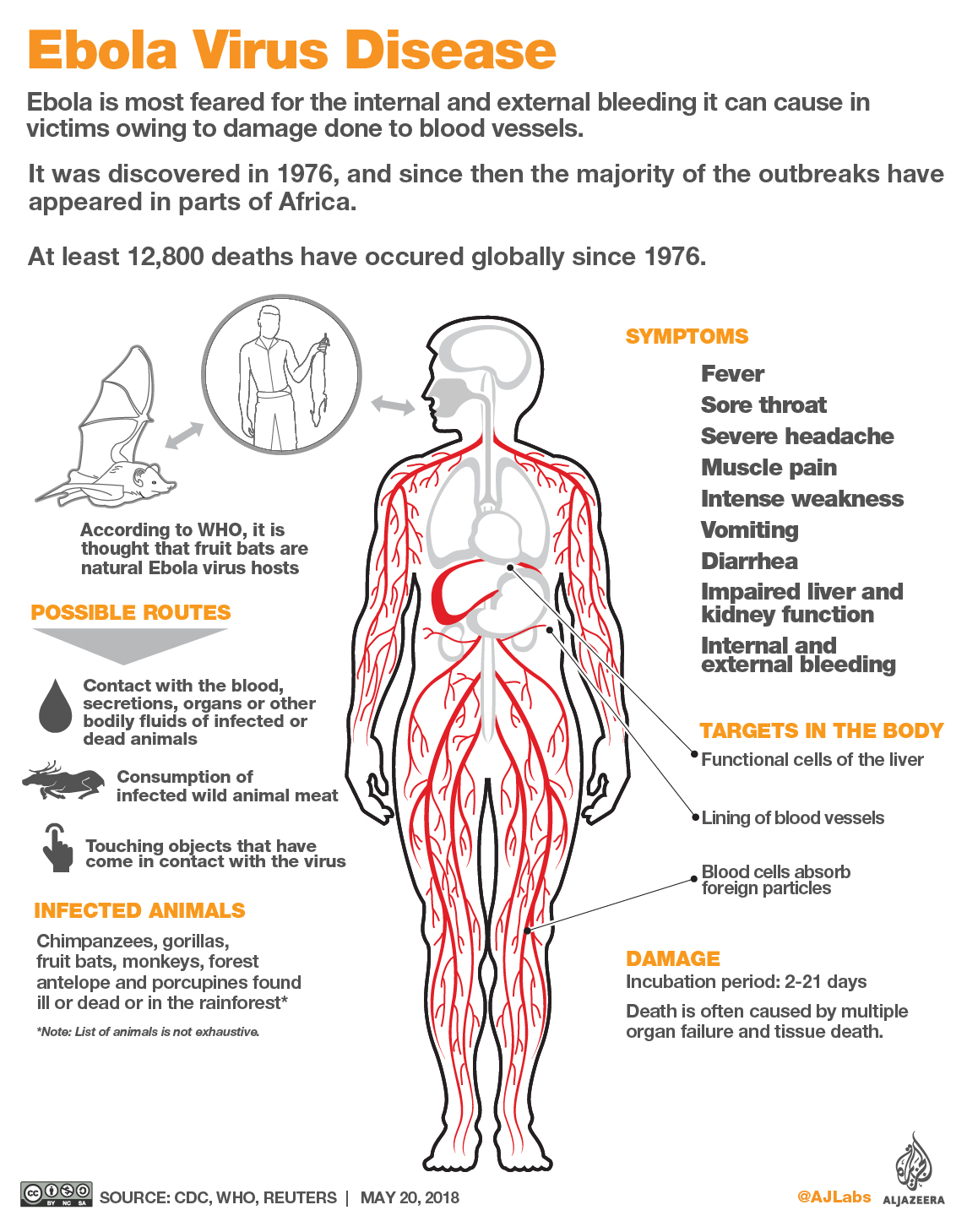First Ebola patient in DR Congo’s Goma dies
The priest’s case is the first in a major urban hub in DR Congo and is causing deep concern in neighbouring Rwanda.

The first patient to be diagnosed with Ebola in the eastern Democratic Republic of Congo’s (DRC) largest city, Goma, has died, according to an official.
The spread of the virus to Goma, a city of some two million people on the DRC’s border with Rwanda, has raised fears the nearly-year long outbreak could spread more widely.
Keep reading
list of 4 itemsUganda declares end of Ebola after 4-month outbreak
Uganda’s Ebola outbreak nearly under control, says Africa CDC
Ebola vaccines produced lasting antibodies during trial: Studies
The patient was a pastor who became infected during a visit to the town of Butembo, one of the epicentres of the epidemic, before taking a bus to Goma, according to DRC’s health ministry.
He was being driven from Goma to a clinic in Butembo on Monday to receive treatment when he died, North Kivu province’s Governor Carly Nzanzu told an Ebola response meeting on Tuesday.
“Unfortunately, I can confirm that the patient died,” Nzanzu said. “He died during transfer by road.”
The pastor had preached at seven churches during his visit to Butembo, a town 300km to the north of Goma, and had regularly touched worshippers, including the sick, DRC’s health ministry said.
On his return to Goma on Sunday, he went to a clinic with a fever, was diagnosed with Ebola and sent back to Butembo, which is better geared than Goma for treating the disease, it added.
The World Health Organization (WHO) said on Monday that health officials had identified 60 people who had come into contact with the pastor since he was taken ill and that half of them had been vaccinated.
More than 1,600 people have died from Ebola since August, making it the second-deadliest Ebola epidemic ever.

Goma had been preparing for the arrival of Ebola for months by setting up hand-washing stations, making sure moto-taxi drivers did not share helmets, vaccinating 3,000 health care workers and running an operational treatment centre since February.
Tedros Adhanom Ghebreyesus, the director-general of the World Health Organization (WHO), said in a statement on Monday that the priest’s case threatened to be a “game-changer” in the ongoing epidemic.
Ghebreyesus pointed to Goma’s sizeable population and its proximity to neighbouring Rwanda as being of particular concern.
“It is a gateway to the region and the world,” he told a meeting of the United Nations officials and donors gathered in the Swiss city of Geneva.
“Although this is a very concerning development, it’s one that we and the government have expected and prepared for,” he added.
Oly Ilunga Kalenga, the DRC’s health minister, insisted meanwhile the situation was “not a humanitarian crisis”.
UN to weigh raising global alarm
Ghebreyesus also said that WHO’s emergency committee would be convened once again on Wednesday to consider raising the global alarm over the outbreak after officials at all three previous such meetings – including one last month – decided against doing so despite registering “deep concern”.
International health emergency declarations almost always boost global attention and lead to an increase in aid.
Rwanda said it would step up border monitoring and urged its citizens to avoid “unnecessary” travel to eastern DRC.
Three Ebola cases were confirmed in neighbouring Uganda a month ago, but no new cases have since been registered in that country.
Prior to the confirmed case in Goma and the earlier cases in Uganda, the Ebola outbreak was previously confined to more rural regions of North Kivu and neighbouring Ituri province after emerging eleven months ago.
Combined, the two provinces border Rwanda, Uganda and South Sudan.
A toxic mix of active armed groups and deep-rooted mistrust of health officials among local communities have hampered efforts to halt the virus there with nearly 2,500 cases registered so far, according to DRC’s Health Ministry.
Unidentified attackers killed two Ebola health workers near Mukulia in North Kivu over the weekend, the latest in a string of assaults this year that have killed or injured dozens of responders.
Amid the unrest, health workers have vaccinated some 160,000 people. The vaccine is experimental but is estimated to be 97.5 percent effective and, according to WHO, may protect a person for up to 12 months.
The world’s worst epidemic of Ebola, a haemorrhagic fever that can spread through bodily fluids, killed about 11,300 people in West Africa as it surged through Guinea, Sierra Leone and Liberia from 2013 to 2016.
